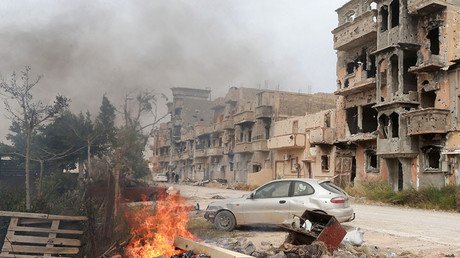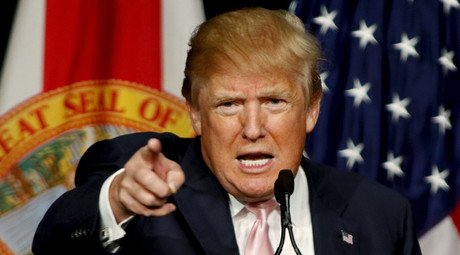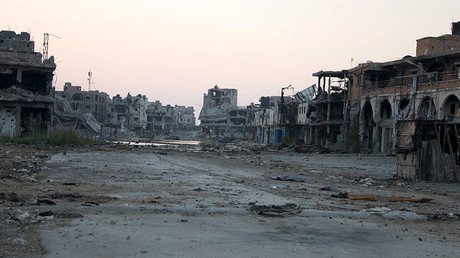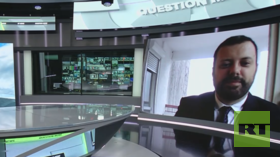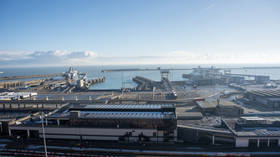'S**t show': Obama blames UK & other European states for post-Gaddafi Libya 'mess'
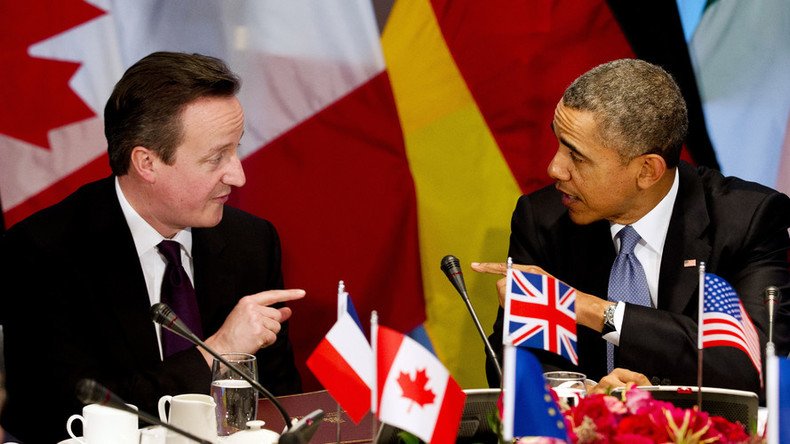
US President Barack Obama has blamed UK Prime Minister David Cameron and other European leaders for the current chaos in Libya, saying he had “more faith” in them being invested in the follow-up, given Libya’s proximity.
Speaking to The Atlantic, Obama acknowledged the problems faced by Libya since the fall of Gaddafi in 2011, referring to the situation as a “mess” – and in private as a “s**t show.”
“...We actually executed this plan as well as I could have expected: We got a UN mandate, we built a coalition, it cost us $1 billion — which, when it comes to military operations, is very cheap. We averted large-scale civilian casualties, we prevented what almost surely would have been a prolonged and bloody civil conflict. And despite all that, Libya is a mess,” he said.
In March of 2011, the UN Security Council (UNSC) adopted a resolution on Libya authorizing the international community to “take all necessary measures” to protect the civilian population. The resolution called for an immediate ceasefire in Libya and creating a no-fly zone over the country.
After the resolution was passed, however, a US-led coalition proceeded to intensively bomb the Libyan army.
Russia and many of its allies around the world found this unacceptable, saying that the UN Resolution 1973 spoke only of establishing a no-fly zone that was supposed to guarantee civilian security, and was not a green light to bring about regime change.
“It is unacceptable to use the mandate subsequent upon UN Resolution 1973, the adoption of which was quite an ambiguous move, to achieve the goals which clearly are beyond its scope as the resolution stipulates only measures to protect civilian population,” the Russian Foreign Ministry said.
READ MORE: Calls grow for allies to stop air strikes on Libya
Obama went on to state that the ‘mess’ was largely due to the inaction of British Prime Minister David Cameron, who was “distracted by a range of other things” at the time.
He also criticized France’s then-President Nicolas Sarkozy for being too eager to take credit for the intervention to overthrow Muammar Gaddafi.
"Sarkozy wanted to trumpet the flights he was taking in the air campaign," Obama said, "despite the fact that [the US] had wiped out all the air defenses and essentially set up the entire infrastructure."
Obama said that such bragging on the part of Sarkozy was fine, because it allowed the US to “purchase France's involvement in a way that made it less expensive for us and less risky for us.”
There was just one problem with that plan, according to the US president.
“From the perspective of a lot of the folks in the foreign-policy establishment, well, that was terrible. If we're going to do something, obviously we've got to be up front, and nobody else is sharing in the spotlight,” he said, noting that Sarkozy was voted out of office less than a year after the fall of Gaddafi.
But Abdel Bari Atwan, editor of Al-Quds Al-Arabi newspaper, told RT that although Cameron and Sarkozy are also responsible for the chaos in Libya, Obama is the "major responsible figure."
"I believe Obama realized that it was a huge mistake and miscalculation, and he is trying to blame everybody else except himself," he said, adding that such a move by an American president is "unprecedented."
He went on to stress that the current situation in Libya is "much, much worse than it used to be during the Gaddafi regime."
"It is a huge mess there, bloodshed, a failed state, militia controlling most of the country. Also now, Islamic State has more than 7,000 fighters in Libya," he said.
The West "deposed Gaddafi, and they left. And after that, who took over? The militia. Armed militia...the whole region, North Africa, is destabilized because of the British and American and French intervention. How can we solve it? It may be too late now. Libya is dismantled completely, Libya is a tribal country now, a militia country, so it's not a state anymore," Atwan concluded.
‘Free riders’
Speaking more generally on what he calls a “free rider” mentality in times of conflict, Obama explained that EU countries have had a “habit” of pushing the US to act over the past several decades, but then shown “an unwillingness to put any skin in the game.”
The US president went on to stress that “free riders aggravate me.”
“When I go back and I ask myself what went wrong,” Obama said, “there’s room for criticism, because I had more faith in the Europeans, given Libya’s proximity, being invested in the follow-up.”
Obama recently stood up to ‘free rider’ Cameron, warning that the UK would no longer be able to maintain its so-called “special relationship” with the US if it did not commit to spending at least 2 percent of its GDP on defense.
“You have to pay your fair share,” the US president told his British counterpart at the G7 summit in June 2015. Cameron subsequently met the 2 percent threshold.
But Obama didn't place all the blame on Cameron and Sarkozy. He admitted that the “degree of tribal division in Libya was greater than our analysts had expected. And our ability to have any kind of structure there that we could interact with and start training and start providing resources broke down very quickly.”
Speaking to a former colleague in the US Senate recently, Obama declared that the outcome of Libya was enough evidence to show him that “there is no way we should commit to governing the Middle East and North Africa...that would be a basic, fundamental mistake.”
Libya has been consumed by violence since the 2011 NATO-led campaign to topple Gaddafi, with rival governments and armed groups fighting for control of the oil-rich North African country. It has become a key operating base for Islamic State (IS, formerly ISIS/ISIL). A UN report published Thursday said that IS had "significantly expanded" the amount of territory it controls in the country.
Meanwhile, there have been reports that the UK is mulling the possibility of stepping up its involvement in the country amid fears that its campaign against IS in Syria and Iraq needs to be widened to include Libya.
Responding to Obama's comments to the Atlantic, a British government spokesperson said: “I think we would share the President of the United States' assessment that there are real challenges in Libya, that's why we are continuing to work hard with our international partners to support a process in Libya that puts in place a government that can bring stability to that country and why we are talking about how we can support such a government in the future,” as cited by the British media.
